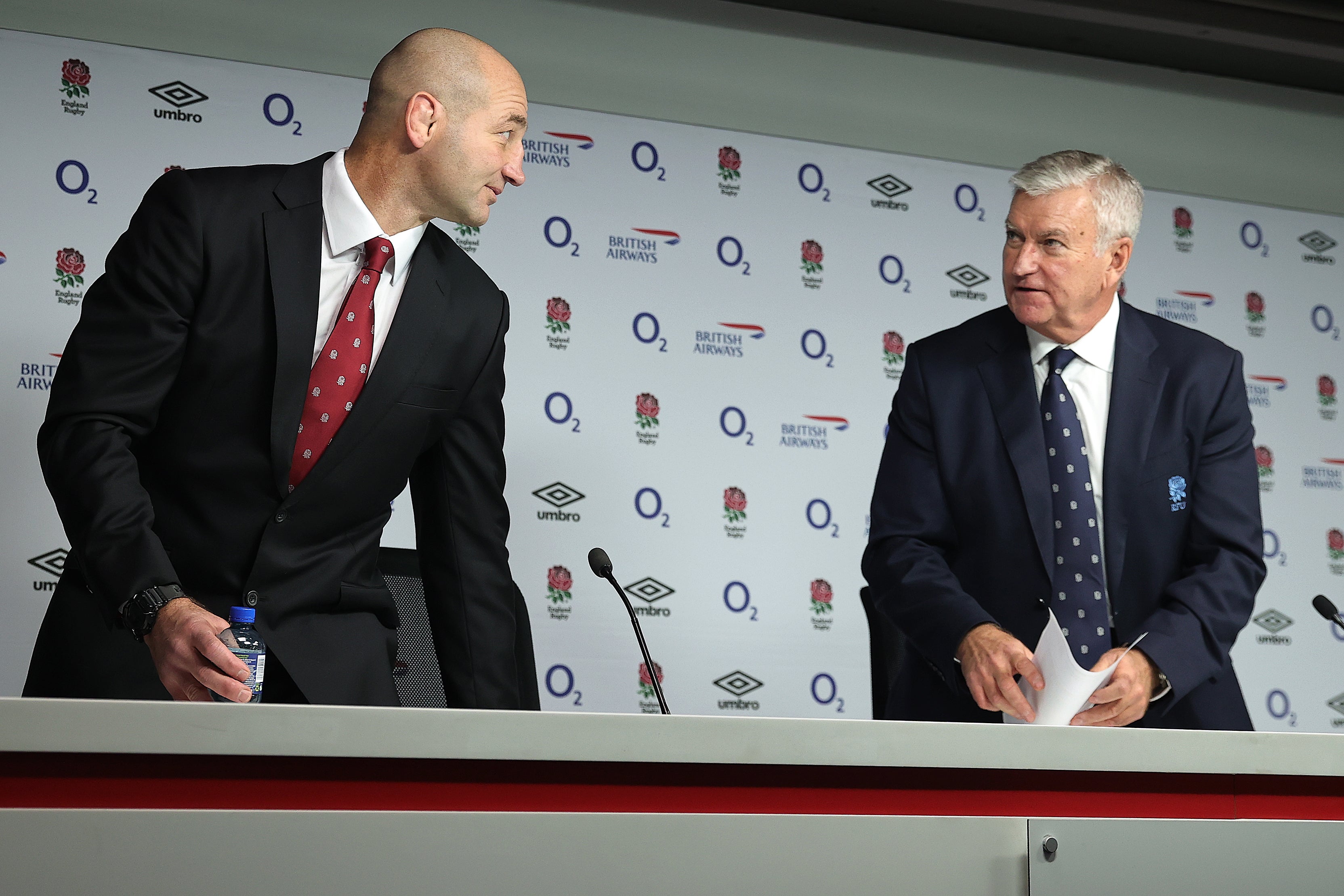
As England scramble to distance themselves from the Eddie Jones era as quickly as possible, there is a certain irony to the fact that his replacement owes his coaching career almost entirely to the Australian.
Steve Borthwick – the Leicester Tigers boss appointed by the RFU on Monday to coach England’s men’s side and salvage the wreckage created by the end of Jones’s time at Twickenham with a Rugby World Cup just nine months away – earned his stripes under the 62-year-old.
Three years as forwards coach of Japan, culminating in perhaps the biggest upset in rugby history, was followed by four years in the same role with England, both with Jones as his manager. In fact, Borthwick is seen as the glue behind the scenes of one of the most successful periods in English rugby history. That 2015-2019 spell included a grand slam, another Six Nations title and a World Cup final appearance.

The former second-row has, of course, since struck out on his own and brought success back to Tigers but if you want to change the negative atmosphere currently surrounding a team, then why appoint the architect’s former deputy? After all, Borthwick was a key part of the England staff back in 2018 when Bath owner Bruce Craig accused Jones of creating a “bullying culture” and, certainly, few players are currently effusive in declaring their love of spending time in England camp.
However, Borthwick is a very different man to his predecessor, whose abrasive, combative demeanour quickly lost its ‘charm’ and effectiveness when the results no longer followed. Jones was the charismatic king of the barbed quip and thinly-veiled dig in every press conference, although in truth he usually opted to omit the veil entirely, whereas the quiet Cumbrian is almost comically different to that in his dealings with the media – calculated, taciturn and reserved, deliberately offering up little.
His existing knowledge of the England squad will be a huge boon. The playing personnel are not hugely different to when he left the national set-up in 2019 and some of the newer stars such as Freddie Steward and Jack van Poortvliet have been nurtured by him at Leicester anyway. This isn’t an England team that requires a complete overhaul to compete with the best, despite what the autumn international performances may indicate. The talent is there and with a tweaked kicking game, a cohesive attacking plan, attention to detail at the set-piece and a shot of confidence, results could quickly turn. The new coach is more than capable of delivering all of that.

The tedious recent discourse around the England men’s football team appointing a foreign coach constituting ‘cheating’ was mercifully ended when Gareth Southgate announced he would be staying in the role through to Euro 2024 but there is something to be said for a coach being able to relate to his players pulling on their national jersey and fighting for the badge. With 57 England caps to his name, and having served as captain for the last two years of his time as an international, the 43-year-old will certainly be able to convey the importance of wearing the red rose.
Importantly, Borthwick also has a secret weapon that he’s bringing with him to the job. Kevin Sinfield. And it’s the talented defence coach, who also makes the move from Leicester to Twickenham, that is the reason the head coach will succeed in his role.
Borthwick was adamant that he wanted Sinfield – the former England and Great Britain rugby league international – by his side at Twickenham. Leicester were understandably keen to retain their rising star, and he was even slated to replace his boss as Tigers’ head honcho, but the RFU loosened the pursestrings and paid a reported £1m to release the duo from their contracts.
They make a formidable team. It would be overly simplistic to call them the brains and brawn of the operation respectively, because both men bring far more to the table than those one-dimensional labels indicate, but it’s true that Borthwick’s analytical brain and incredible attention to detail are perfectly complemented by Sinfield’s natural charisma that inspires and motivates. One captures players’ minds, while the other captures their hearts.
Leicester players speak about Sinfield’s 'apex of pain' mantra that encourages them to shine brightest when the going is toughest. He has an aura that engenders respect and his charges gladly dig deep on his behalf. His system has added a steel that has turned the Tigers into one of the meanest defences in the northern hemisphere. In their brilliant season last year, no English team allowed fewer tries or fewer points, while they restricted much-fancied Saracens to just four penalties in a hard-fought 15-12 win in the Premiership final to secure the trophy.
When he first made the move to Welford Road, Borthwick described Sinfield as a ‘serial winner’. Taking Tigers from the doldrums to Premiership champions once more proved that assessment right and added to a remarkable career of success. During his 18-year rugby league playing career, the Oldham native won seven Super League titles, three World Club Cups and two Challenge Cups with Leeds Rhinos. He retired as the most decorated English player in the sport’s history and no-one has played more Super League games or scored as many points.

The transition from league player to union coach has been made with aplomb and this latest step up to international level will hold no fear. It may also be in the back of RFU CEO Bill Sweeney’s mind that England have made an unfortunate habit of allowing supremely talented homegrown coaches from the 13-man code to slip through their grasp in recent years.
Shaun Edwards remains ‘the one who got away’ and the fact he has somehow never worked at Twickenham despite a sterling record with Wasps, Wales and France that marks him out as arguably the sport’s most outstanding northern hemisphere coach of the 21st century will forever be a black eye for English rugby. Meanwhile, Andy Farrell – cleared out as defence coach after the Stuart Lancaster era came to such an ignominious end in 2015 – has gone on to lift Ireland to previously unreached heights. There’s a feeling that not securing Sinfield now could lead to similar woe.
The 42-year-old is also rightly lauded for his off-field exploits raising incredible sums of money for research into motor neurone disease, the horrific degenerative illness that recently took the life of former British & Irish Lion Doddie Weir and afflicts Sinfield’s friend and ex-Rhinos teammate Rob Burrow. He recently completed a challenge that saw him run over 300 miles in a week – doing seven ultramarathons on consecutive days – finishing at Old Trafford and being given a rapturous reception on the pitch at half-time of the Rugby League World Cup final between Australia and Samoa. He raised a staggering £1.4m for his efforts.
“I am not superman at all,” he had said ahead of the challenge. “In my own mind, I am going on a run for a mate with some mates.” There are plenty who would disagree with that humble assessment of his charitable feats away from rugby and England may just find that Kevin Sinfield is, in fact, the superman who can lift them to glory on the field after all.







